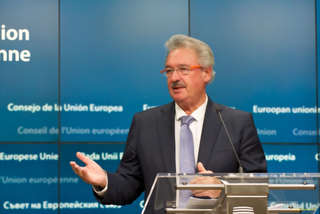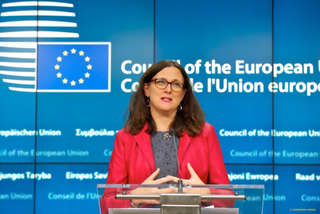The "Trade" part of the Foreign Affairs Council chaired by the Minister for Foreign and European Affairs, Jean Asselborn, took place in Brussels on 27 November 2015. In the presence of the European Trade Commissioner, Cecilia Malmström, the Ministers focused on the Transatlantic Trade and Investment Partnership (TTIP) negotiations with the United States. They also discussed the preparations for the WTO Ministerial Conference, which will take place in Nairobi in December 2015, and they focused on the negotiations with Mercosur, Japan and the ASEAN countries with a view to concluding free trade agreements. The Ministers further adopted conclusions on the EU's trade and investment policy.
TTIP
In the presence of the European Trade Commissioner, Cecilia Malmström, the Council focused on the negotiations concerning a Transatlantic Trade and Investment Partnership (TTIP) with the United States.
 During the press conference, Jean Asselborn stated that he was "aware of the hostility of part of our public opinion on this agreement", and stressed the need to "continue with communication and transparency", citing as an example a conference with the social partners on the TTIP which took place on 17 November 2015.
During the press conference, Jean Asselborn stated that he was "aware of the hostility of part of our public opinion on this agreement", and stressed the need to "continue with communication and transparency", citing as an example a conference with the social partners on the TTIP which took place on 17 November 2015.
The Minister reiterated that the TTIP "does not intend to call our European models into question". "We do not want a TTIP at any cost; we want a comprehensive and qualitative agreement", he insisted. The right of governments to pursue public policy objectives on issues of protecting health, employees, consumers and the environment is in no way called into question, he explained.
He reiterated that Cecilia Malmström and US counterpart Mike Froman had made a joint declaration on public services, in which both parties had confirmed that the trade agreements do not prevent governments from providing or supporting the provision of services in areas such as water, education, health and social issues.
The Luxembourg Presidency supported the efforts of the Commission to close the debates on the modernisation of the Investment Court System , the revision of the EU tariff offer or even the area of sustainable development, which aims to maintain high levels in terms of labour and the environment, the Minister further revealed.
Jean Asselborn outlined that during the next round of talks in February 2016, both parties will discuss among other things the proposal on the modernisation of the investment protection system which was sent to the US party on 12 November. "Meanwhile, the negotiators plan to meet more frequently in other ways in order to accelerate the pace of negotiations", he underlined. Several meetings will also take place to prepare the exchange of the initial offers on public procurement in February 2016, with, as an overall objective, the conclusion of negotiations on the TTIP under the Obama administration, concluded Jean Asselborn.
The Minister also congratulated the Commissioner on having obtained the agreement in principle of the United States to give parliamentarians and national experts access to the consolidated negotiating texts.
Cecilia Malmström meanwhile explained that the consolidated texts that also contain the American positions were previously only available in reading rooms of embassies. She affirmed that these rooms will also be established in the ministries of Member States in order to allow members of national parliaments to access these "confidential documents".
WTO Ministerial Conference
 The Council discussed preparations for the 10th Ministerial Conference of the World Trade Organization (WTO) which will be held in Nairobi from 15 to 18 December 2015.
The Council discussed preparations for the 10th Ministerial Conference of the World Trade Organization (WTO) which will be held in Nairobi from 15 to 18 December 2015.
The Commission reported on the negotiations, conducted within the framework of the WTO, relative to the Doha Development Agenda (DDA) which aims to reform the international trading system through the reduction of trade barriers and revised trade rules. It presented an overview of what may constitute an acceptable outcome in Nairobi and the work to be done thereafter.
Minister Asselborn acknowledged that while the work was progressing in Brussels and Geneva, where the WTO is based, "the results are not at all encouraging". However, he wished to point out that despite a very ambitious bilateral negotiating agenda, "the WTO shall remain at the centre of the international trading system for the EU". For her part, Commissioner Cecilia Malmström stressed that "the EU works closely with all possible countries to obtain the most comprehensive agreement possible". She nevertheless regretted that other players "do not seem to want to contribute to a comprehensive agreement". According to her, "we need the WTO to work because there are many aspects to address at global level", she said.
As a reminder, the negotiations on the DDA began during the fourth ministerial conference, held in Doha (Qatar) in 2001. After the breakdown of negotiations in 2008, several attempts have been made to rekindle them.
Conclusions on a transparent, accountable and effective trade policy
The Ministers adopted conclusions on the EU's trade and investment policy on the basis of a communication of the Commission published on 15 October 2015. Entitled "Trade for all – Towards a more responsible trade and investment policy", the communication advocates a transparent, accountable and effective trade and investment policy, which "offers real economic opportunities".
The Council decided in favour of open, equitable trade that takes into account the level of development of the negotiating partners, indicated Jean Asselborn. According to him, trade and investment can make a significant contribution to inclusive growth and employment in Europe. He also advocated better communication and open dialogue with citizens on the objectives of trade policy and the agreements under negotiation.
Negotiations between the EU and Mercosur on a free trade agreement
The Commission reported on the prospects for progress concerning a comprehensive free trade agreement with Mercosur, the largest economic bloc in South America, covering trade in industrial and agricultural goods and services, the right of establishment and public procurement.
Minister Asselborn pointed out that during the EU-CELAC Summit in June 2015, the EU reaffirmed its commitment in favour of a "vast and comprehensive free trade agreement with Mercosur, which also aims to remove barriers and strengthen trade". Even if, according to him, the Ministers succeeded today in fleshing out a "certain direction on which the Commission, the Council and the European Parliament are going to work", "everything also depends on the seriousness of the Mercosur offer". The Minister also emphasised that European investments in Brazil are greater than European investments in Russia and China combined.
As a reminder, negotiations were launched in 2000, but were in fact suspended between 2004 and 2010. During an EU-Mercosur ministerial meeting which was held in January in 2013 in Santiago (Chile), the parties agreed to exchange offers on market access, but this has never happened, although the EU was ready to do so. The talks were again suspended in September 2014 when an offer made by Mercosur was considered inadequate.
EU-Asia – Japan and ASEAN Negotiations
The Council also discussed various negotiations that the EU is currently conducting with the Asian countries. It looked in particular at the free trade agreement recently concluded with Vietnam, the negotiations on free trade agreements with the Philippines, Malaysia and Thailand, the EU's overall business strategy with regard to the Association of Southeast Asian Nations (ASEAN) and the repercussions of the "Trans-Pacific Partnership" (TPP) which was recently concluded between the partner countries of Asia and the Pacific and the USA, the negotiations on a free trade agreement with Japan and the negotiations with Burma/Myanmar on investments.
Other business
The Council also focused on the trilateral consultations with Ukraine and Russia. It was informed by the Commission of the preparations for a ministerial meeting scheduled for 1 December 2015.
The Ministers also discussed the crisis in the European steel industry, ensuring follow-up of the subject in trade terms by the Extraordinary Competitiveness Council on 9 November.
Over lunch, they also discussed recent developments in trade relations and in terms of investment with China, especially on the issue of China's market economy status, following its accession to the WTO in 2001, as well as on trade barriers in China, the anti-dumping and countervailing measures of the EU and the negotiations relating to an EU-China investment agreement.
In this regard, Minister Asselborn indicated that in view of the great sensitivity of the topic, the Council will take a position "only when it has received a legal interpretation of China's protocol of accession to the WTO in 2001".

